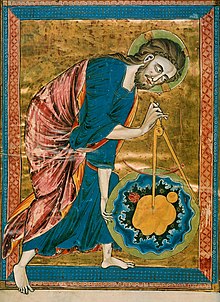
Back علم الكون التوراتي Arabic Йәһүдилектә космология Bashkir Cosmologia bíblica Catalan Biblical cosmology English Cosmología bíblica Spanish کیهانشناسی کتاب مقدس Persian Տիեզերաբանությունը հուդայականության մեջ Armenian Kosmologi Alkitab ID Cosmologia biblica Italian 聖書の宇宙論 Japanese

La cosmologie biblique est la conception biblique du cosmos en tant qu'entité organisée et structurée, ayant une origine, un ordre, un sens et un destin[1],[2]. La Bible a été constituée au cours de nombreux siècles par plusieurs auteurs, et reflète l'évolution de la croyance religieuse ; par conséquent, sa cosmologie n'est pas toujours uniforme[3],[4]. Les textes Bibliques ne représentent pas nécessairement les convictions de tous les Juifs ou Chrétiens de l'époque ou ils ont été mis par écrit : la majorité des textes qui forment la Bible hébraïque ou l'Ancien Testament en particulier, représentent les croyances d'un petit segment d'une ancienne communauté israélite, les membres d'une tradition religieuse tardive de Judée basée à Jérusalem, et exclusivement consacrée au culte de Yahvé[5].
Les anciens Israélites envisageaient un univers composé d'une terre plate en forme de disque flottant sur l'eau, les cieux au-dessus, l'au-delà en-dessous. Les humains habitaient la Terre au cours de leur vie et l'au-delà après la mort — qui était un endroit moralement neutre[6]. Ce n'est qu'à l'époque hellénistique (v. 330 avant notre ère) que les Juifs commencent à adopter l'idée grecque d'un lieu de punition pour les mauvaises actions, et d'un paradis pour les vertueux[7]. Dans cette période également, l'ancienne cosmologie à trois niveaux fut dans une large mesure abandonnée pour le concept grec d'une terre sphérique suspendue dans l'espace, au centre de plusieurs sphères concentriques[8].
Les premiers mots du récit de la création dans la Genèse (Genèse 1:1-26) résument la façon dont le cosmos aurait été conçu : « au commencement, Dieu créa les cieux et la terre ; Yahweh, le Dieu d'Israël, était le seul responsable de la création et n'avait pas de rivaux »[9]. Plus tard les penseurs juifs, en adoptant les idées de la philosophie grecque, conclurent que la Sagesse de Dieu, sa Parole et son Esprit ont pénétré toutes choses et leur ont donné une unité[10]. Le christianisme à son tour adopta ces idées et identifia Jésus à la parole créatrice : « au commencement était la Parole, et la Parole était avec Dieu, et la Parole était Dieu » (Jean 1:1)[11].
- Lucas 2003, p. 130
- Knight 1990, p. 175
- Bernstein 1996, p. 134: « The canon of the Hebrew Bible [...] was formed of [...] diverse writings composed by many men or women over a long period of time, under many different circumstances, and in the light of shifting patterns of religious belief and practice. [...] Indeed, the questions under investigation in this book concerning the end of an individual's life, the nature of death, the possibility of divine judgment, and the resultant reward or punishment [...] are simply too crucial to have attracted a single solution unanimously accepted over the near millennium of biblical composition. »
- Berlin 2011, p. 188
- Wright 2002, p. 52: « The religious ideology promoted in a majority of the texts that now form the Hebrew Bible represent the beliefs of only a small portion of the ancient Israelite community: the late Judean individuals who collected, edited, and transmitted the biblical materials were, for the most part, members of a religious tradition centered in Jerusalem that worshipped the god Yahweh exclusively. »
- Wright 2002, p. 117,124–125
- Lee 2010, p. 77–78
- Aune 2003, p. 119: « During the Hellenistic period a geocentric model of the universe largely replaced the older three-tiered universe model, for Greek thinkers (such as Aristotle and Eratosthenes) proposed that the earth was a sphere suspended freely in space." »
- Wright 2002, p. 53: « Biblical texts from all historical periods and a variety of literary genres demonstrate that in Yahwistic circles, that is, among people who worshipped Yahweh as the chief god, God was always understood as the one who alone created heaven, earth, and all that is in them. [...] Yahweh, the Israelite god, had no rivals, and in a world where nations claimed that their gods were the supreme beings in the universe and that all others were subject to them, the Israelites' claim for the superiority of Yahweh enabled them to imagine that no other nation could rival her [...]. Phrases such as 'Yahweh, God Most High, Creator of heaven and earth' [...] and related phrases for Yahweh as creator and almighty master of the cosmos have parallels in earlier Canaanite terminology for the god El. [...] In fact, the Israelites did not create these phrases but inherited them from earlier Canaanite civilizations. Moreover, later editors of the Hebrew Bible used them to serve their particular monotheistic theology: their god is the supreme god, and he alone created the universe. »
- Kaiser 1997, p. 28
- Parrish 1990, p. 183–184
© MMXXIII Rich X Search. We shall prevail. All rights reserved. Rich X Search